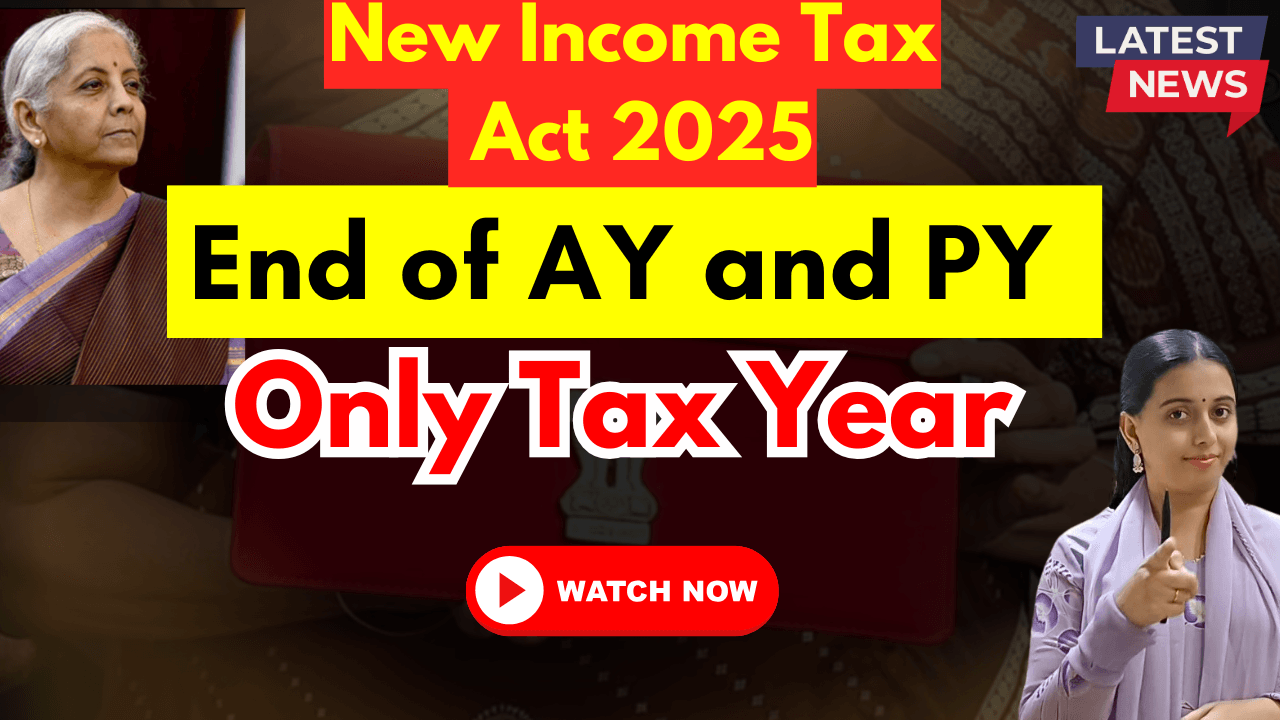End of Assessment Year (AY) and Previous Year (PY)
Introduction
End of Assessment Year (AY) and Previous Year (PY) The Income Tax Act 2025 is set to introduce a major reform in the tax filing system by eliminating the concepts of Assessment Year (AY) and Previous Year (PY). Instead, taxpayers will follow a single tax year approach, simplifying income tax compliance. This change is expected to make tax filing more straightforward and remove common confusion regarding AY and PY.
Watch This video For Better Understanding- https://youtu.be/A_2Kt7eVGGY

What Are Assessment Year (AY) and Previous Year (PY)?
Traditionally, the Assessment Year (AY) refers to the year in which taxpayers file their income tax returns for income earned in the Previous Year (PY).End of Assessment Year (AY) and Previous Year (PY) The Previous Year is the financial year in which income is generated. For example:
- If income is earned between April 1, 2023, and March 31, 2024, it falls in PY 2023-24.
- The return for this income is filed in AY 2024-25.
This system often leads to confusion among taxpayers, especially first-time filers.
What Will Change in the Income Tax Act 2025?
With the proposed reform, the concept of AY and PY will be removed, and taxpayers will follow a single tax year for both income computation and return filing. The tax year will align with the financial year, making compliance easier.
Expected Changes:
- One Tax Year System – Taxpayers will file returns for income earned in the same financial year, eliminating the need to remember AY and PY differences.
- Simplified Return Filing – End of Assessment Year (AY) and Previous Year (PY) The new system will streamline tax filing procedures, making it easier for salaried individuals, businesses, and professionals.
- Clarity in Compliance – Taxpayers and businesses will have a more transparent process, reducing errors caused by misunderstanding AY and PY.
- Easier Tax Notices and Assessments – Since tax filings and assessments will be based on a single tax year, the system will be more efficient for both taxpayers and the Income Tax Department.
Benefits of Removing AY and PY
- Better Compliance and Understanding
Many taxpayers, especially first-time filers, find the AY-PY distinction confusing. A single tax year will simplify the process and increase compliance rates.
- Faster Processing and Assessments
Since tax filings will directly match the income year, processing of returns, assessments, and refunds is expected to be faster.
- Alignment with Global Standards
Many countries follow a single tax year approach. India adopting this system will align its tax framework with international standards.
- Reduction in Errors and Penalties
A common mistake among taxpayers is choosing the wrong AY while filing returns, leading to rejection or delays. With a single tax year, such errors will be eliminated, ensuring smoother filing.
https://www.incometax.gov.in/iec/foportal/
Possible Challenges and Transition Issues
- Adapting to the New System – Taxpayers, businesses, and tax professionals will need time to adjust to the new tax year system.
- Changes in IT and Compliance Systems – End of Assessment Year (AY) and Previous Year (PY) The Income Tax Department will need to update its software, portal, and forms to accommodate the new tax structure. End of Assessment Year (AY) and Previous Year (PY)
- Transition Period Concerns – If the new system is implemented mid-year, there could be initial confusion on handling the transition from AY-PY to a single tax year.
Conclusion
The Income Tax Act 2025 aims to simplify tax compliance by eliminating the AY-PY system and introducing a single tax year. End of Assessment Year (AY) and Previous Year (PY) This reform will reduce confusion, streamline tax filing, and align India’s tax structure with international practices. While challenges exist, the overall impact is expected to be positive for taxpayers and businesses.
As the government finalizes this proposal, taxpayers should stay updated and prepare for a new era of tax filing in India.
For More Information : https://taxgyany.com/

